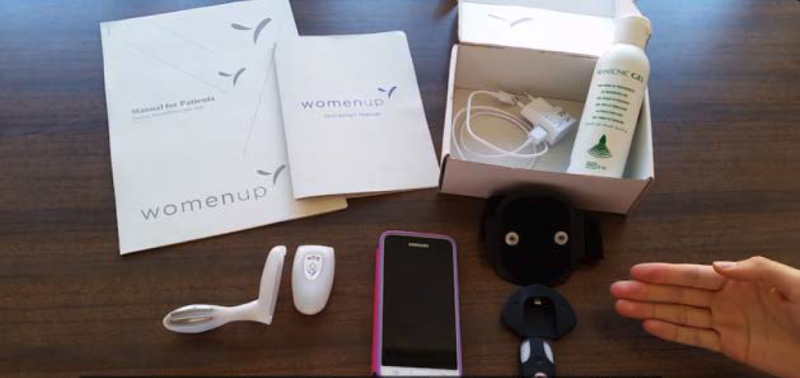WomenUp
WomenUp is a medical device that helps female patients to perform kegel exercises to reinforce the pelvic floor muscles.

Technology Description
WomenUp is a medical device that helps female patients to perform kegel exercises to reinforce the pelvic floor muscles. The medical device consists of an electronic controller inserted in a vaginal probe to detect the patient’s muscle activity and a transmitter subunit (FAROS) attached to the patient’s body through an adjustable belt. Both devices use Electromyography technology to record the vaginal and belly muscular activity. The product is complemented by a mobile phone App that provides a set of serious games to exercise the pelvic floor and a cloud base platform to upload the patient’s data that the physiotherapist will analyze.
Unmet Clinical Problem (Challenge)
Female Urinary incontinence affects women despite age, nationality, or ethnic background. Urinary incontinence (UI) is defined as involuntary leakage of urine, commonly resulting from weak pelvic floor muscles (PFM). The prevalence of the problem depends on the age group, but it has been estimated that approximately 20 percent of working-aged women in Europe suffer from UI. Notably, issues with UI seem to increase with age. Even though there are several types of UI, stress urinary incontinence (SUI) is the dominant type, and it refers to involuntary leakage during physical movement or activity, such as sneezing or coughing. Factors that have been documented to expose women to UI include aging, childbirth, smoking, and overweight. A urologist usually refers patients to Physiotherapists to encourage them with kegel exercises training to reinforce the pelvic muscles. Pelvic floor training refers to the voluntary contraction and relaxation of specific muscles and aims to increase the strength of PFM.
Pelvic floor training refers to the voluntary contraction and relaxation of specific muscles and aims to increase the strength of PFM. Several devices for training PFM exist on the market, but a device that connects the consumer and the healthcare professional by utilizing electromyography (EMG) has yet to appear. As most of the solutions promising treatment for UI are solely home treatment devices containing a manometer, the Women-Up device has the potential to stand out from competing devices.
Proposed Solution

The WOMEN-UP is an eHealth-based medical device that includes advanced cutting-edge technology for managing Urine Incontinence by encouraging patients to perform physical exercises to enhance the pelvic floor muscles. With this technology, the training instructions are delivered via a smartphone, and the software includes interactive games and biofeedback to boost motivation. The ICT-based system will feature personal exercise regimens and patient diaries. Through various forms of interaction and feedback, these elements will assist patients in managing their training, receiving suggestions for lifestyle modifications, and finding encouragement to stick with the routine. The proposed approach encourages patients to perform the exercises proposed by physiotherapists and expects to increase the number of patients treated by reducing the frequency of clinic visits.
“WomenUp is an eHealth-based medical device that provides an innovative breakthrough in the management and treatment of Urine Incontinence chronic disease.”
Medical devices to train pelvic floor muscles using the kegel exercise are already available in the market. However, WomenUp is a clinically validated medical device, a feature that adds value compared to most of the competitors. Most of these devices use pressure sensors and accelerometer technologies to detect muscle activity indirectly, but none provide real feedback about which muscles were exercised. Women up measure muscle activity using electromyography, being able to distinguish pelvic and abdominal muscles to provide accurate feedback. WomenUp clinical trial highlighted its efficacy in managing Urine Incontinence improving treatment adherence while reducing dropouts. The study also found a correlation between pelvic muscle strength (Oxford Score) and treatment adherence, where WomenUp scored highly.
Share: